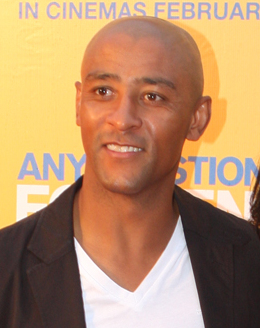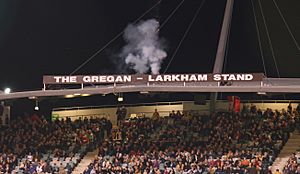George Gregan facts for kids

Gregan in 2012
|
|||||||||||||||||||||||||||||||||||||||||||||||||||||||||||||||||||||||||
| Date of birth | 19 April 1973 | ||||||||||||||||||||||||||||||||||||||||||||||||||||||||||||||||||||||||
|---|---|---|---|---|---|---|---|---|---|---|---|---|---|---|---|---|---|---|---|---|---|---|---|---|---|---|---|---|---|---|---|---|---|---|---|---|---|---|---|---|---|---|---|---|---|---|---|---|---|---|---|---|---|---|---|---|---|---|---|---|---|---|---|---|---|---|---|---|---|---|---|---|---|
| Place of birth | Lusaka, Zambia | ||||||||||||||||||||||||||||||||||||||||||||||||||||||||||||||||||||||||
| Height | 173 cm (5 ft 8 in) | ||||||||||||||||||||||||||||||||||||||||||||||||||||||||||||||||||||||||
| Weight | 80 kg (176 lb) | ||||||||||||||||||||||||||||||||||||||||||||||||||||||||||||||||||||||||
| School | St Edmund's College, Canberra | ||||||||||||||||||||||||||||||||||||||||||||||||||||||||||||||||||||||||
| University | University of Canberra | ||||||||||||||||||||||||||||||||||||||||||||||||||||||||||||||||||||||||
| Children | 3 | ||||||||||||||||||||||||||||||||||||||||||||||||||||||||||||||||||||||||
| Rugby union career | |||||||||||||||||||||||||||||||||||||||||||||||||||||||||||||||||||||||||
|
|||||||||||||||||||||||||||||||||||||||||||||||||||||||||||||||||||||||||
George Musarurwa Gregan is a famous former rugby union player from Australia. He was born in Lusaka, Zambia, on April 19, 1973. George played as a scrum-half, which is a very important position in rugby. He played for the Australian national team, known as the Wallabies, many times. In fact, he is Australia's second most capped player, meaning he played in the second highest number of international games for his country.
George Gregan played for the Brumbies in the Super 12 competition from 1996 to 2007. He helped lead them to win the championship in 2001 and 2004. He was one of the first players for the Brumbies team. As a member of the Wallabies, George won the Rugby World Cup in 1999. He also captained Australia, leading them to a Bledisloe Cup win in 2002. He and his teammate, fly-half Stephen Larkham, played together in 79 international matches. This is a record for a halfback partnership!
Contents
George Gregan's Early Life and Family
George Gregan was born in Zambia. His father was Australian and his mother was from Zimbabwe. When George was two years old, his family moved to Australia. He grew up in Canberra, where he went to St Edmund's College. He later studied at the University of Canberra, earning a degree in Physical Education.
George Gregan is married to Erica, and they have three children: Max, Charlie, and Jazz. In 2004, their son Max was diagnosed with epilepsy. After seeing how many sick children and their parents needed help, George and Erica started the George Gregan Foundation in 2005. This foundation built playgrounds in hospitals and supported doctors studying brain conditions. The foundation closed down in 2021 after helping many families.
George Gregan's Rugby Career Highlights
George Gregan played for Australia's younger rugby teams before joining the main national team. He played for the Australian under-19 and under-21 teams.
Starting His International Rugby Journey (1994-1999)
George Gregan first played for the Wallabies in 1994. This was in a game against Italy in Brisbane, which Australia won. Later that year, George made a very famous tackle against All Black player Jeff Wilson. This tackle helped Australia win the Bledisloe Cup that year. It is still remembered as one of the best moments in the rivalry between Australia and New Zealand rugby teams.
In 1995, Australia played in the World Cup in South Africa. They were the defending champions but lost to England in the quarter-finals. After this World Cup, rugby became a professional sport. This led to the creation of the Super 12 competition, where George became a key player for the ACT Brumbies.
In 1996, the Tri Nations Series began, with Australia, New Zealand, and South Africa competing. George played in most of Australia's games in this new tournament. He even scored a try against the All Blacks.
George became the vice-captain of the Wallabies in 1997. In 1999, the World Cup was held in Wales. Australia played very well, winning all their pool games. George played in matches against Romania and Ireland. The Wallabies then beat hosts Wales in the quarter-finals, with George scoring a try. They went on to defeat defending champions South Africa in the semi-finals. In the final, Australia beat France to become World Champions for the second time!
Leading the Wallabies as Captain (2001-2005)
After John Eales retired in 2001, George Gregan became the captain of the Wallabies. He was a clear choice because he was already vice-captain and always played for the national team.
George played in all six of Australia's matches at the 2003 Rugby World Cup. He scored a drop goal against Ireland in the pool stages. He also scored a try against Scotland in the quarter-finals. George led the Wallabies to beat the All Blacks in the semi-final. After this win, he made a memorable comment to his opponents, saying, "Four more years boys, four more years." This meant New Zealand would have to wait another four years for a chance to win the World Cup. Australia then lost to England in the final.
After the World Cup, George led the Wallabies on a great winning streak in 2004. They beat Scotland twice and got revenge on England, winning 51 to 15. In July 2004, George played his 100th international match for the Wallabies against South Africa in Perth.
In October 2004, George shared that his son had epilepsy. He started an awareness campaign in Australia called 'Get on the Team'. He also became a patron for Brainwave Australia, an organization that helps children with brain conditions.
George missed part of the 2005 Super 12 season because he broke his leg. He returned to play for Australia later that year. In November 2005, he played his 115th international match, becoming the most-capped player for a national team in Test rugby. This meant he had played more international games than anyone else at that time.
Later Career and Retirement (2006-2012)
In June 2006, George Gregan played his 120th international match, setting a new world record. He also became the most-capped Australian captain of all time, leading the team 56 times.
In March 2007, George signed a contract to play for the French club Toulon for the 2007–08 season. He moved to France after the 2007 Rugby World Cup.
George played his last home game for the Brumbies on April 28, 2007. It was also the last home game for his teammate Stephen Larkham. To honor them, a stand at Canberra Stadium was named the Gregan - Larkham Grandstand.
George was still part of the Wallabies squad for the 2007 World Cup. He was named a vice-captain. After playing in France, George joined Suntory Sungoliath in Japan in June 2008.
After retiring from playing, George Gregan became an assistant coach for the Brumbies in 2012. In 2014, he joined the Fox-Sports Rugby commentary team, sharing his knowledge of the game.
George Gregan's Business Ventures
In the late 1990s, George and his wife started planning for his life after rugby. They decided to open a coffee shop business. The first GG's Espresso shop opened in 1999. Today, there are nine GG's Espresso cafes in Sydney and Brisbane. These cafes are part of a larger food and hospitality business called The Gregan Group.
George Gregan's Achievements and Awards
George Gregan has received many honors throughout his career:
- With the Brumbies:
- Won the Super Rugby championship in 2001 and 2004.
- With Toulon:
- Won the Rugby Pro D2 (French second division) in 2007–08.
- With Suntory Sungoliath:
- Won the All-Japan Rugby Football Championship in 2010–11.
- With Australia (Wallabies):
- Won the Rugby World Cup in 1999.
- Won the Tri-Nations Series in 2000 and 2001.
- Won the Bledisloe Cup in 1994, 1998, 1999, 2000, 2001, and 2002.
- General Honors:
- Appointed as a member of the Order of Australia in June 2004 for his contributions to rugby.
- Inducted into the Sport Australia Hall of Fame in 2009.
- Inducted into the World Rugby Hall of Fame in 2013.
- One of the first people inducted into the University of Canberra Sport Walk of Fame.
Images for kids
See also
 In Spanish: George Gregan para niños
In Spanish: George Gregan para niños
 | Georgia Louise Harris Brown |
 | Julian Abele |
 | Norma Merrick Sklarek |
 | William Sidney Pittman |




